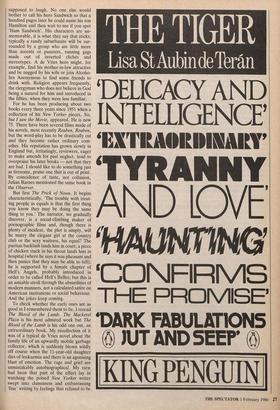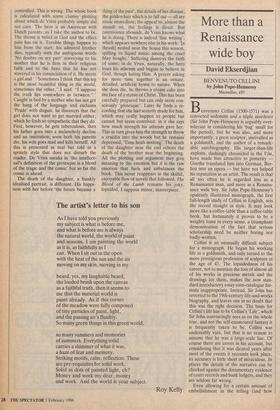The bawdy hand writes on
Mark Amory
THE PRICK OF NOON by Peter de Vries
Gollancz, £8.95
Peter de Vries never stops making jokes — some of them bad, some of them not worth the elaborate setting up they require, many of them funny. He seems unable to resist them. This makes him unique among contemporary novelists. The only writer who gives the same im- pression of having an endless supply, and a particular affection for the weakest, is Tom Stoppard, and he gave up novels after one attempt, Lord Malquist and Mr Moon over 20 years ago. That has characters talking in inappropriate and overdone accents, the Wandering Jew saying 'Top of the morning to you, begorrah' as it were, which de Vries might well use but would feel he had to justify. Nabokov quotes inaccurately on purpose and without attribution, as de Vries does, but I do not think we are supposed to laugh. No one else would bother to call his hero Sandwich so that a hundred pages later he could name his son Hamilton and then wait to see if you spot `Ham Sandwich'. His characters are un- memorable, it is what they say that sticks; typically a randy suburbanite will be sur- rounded by a group who are little more than accents or punsters, running gags made out of inverted clichés and stereotypes. A de Vries hero might, for example, find his mother-in-law attractive and be nagged by his wife or join Alcoho- lics Anonymous to find some friends to drink with. Religion appears frequently, the clergyman who does not believe in God being a natural for him and introduced in the fifties, when they were less familiar.
For he has been producing about two books every three years since 1951 when a collection of his New Yorker pieces, No, but I saw the Movie, appeared. He is now 75. There have been several films made of his novels, most recently Reuben, Reuben, but the word-play has to be drastically cut and they become rather ordinary com- edies. His reputation has grown slowly in England but, irritatingly, reviewers, eager to make amends for past neglect, tend to overpraise his later books — not that they are bad. I should like to do something just as tiresome, praise one that is out of print. By coincidence of taste, not collusion, Julian Barnes mentioned the same book in the Observer.
But first The Prick of Noon. It begins characteristically, 'The trouble with treat- ing people as equals is that the first thing you know they may be doing the same thing to you.' The narrator, we gradually discover, is a social-climbing maker of pornographic films and, though there is plenty of incident, the plot is simply, will he marry the elegant girl at the country club or the sexy waitress, his equal? The puritan backlash lands him in court; a piece of chicken stuck in his throat lands him in hospital (where he says it was pheasant and then panics that they may be able to tell); he is supported by a female chapter of Hell's Angels, probably introduced in order to be called Hell's Belles; but this is an amiable stroll through the absurdities of modern manners, not a calculated satire on American institutions or social behaviour. And the jokes keep coming.
To check whether the early ones are as good as I remembered them to be, I reread The Blood of the Lamb. The Mackerel Plaza is his most admired work but The Blood of the Lamb is his odd one out, an extraordinary book. My recollection of it was of a typical de Vries novel about the family life of an upwardly mobile garbage collector, which is suddenly blown wildly off course when the 11-year-old daughter dies of leukaemia and there is an agonising blast of emotion. The rage and grief are unmistakably autobiographical. My view had been that part of the effect lay in watching the poised New Yorker writer swept into clumsiness and embarrassing `fine' writing by feelings that refused to be controlled. This is wrong. The whole book is calculated with some clumsy plotting about which de Vries probably simply did not care. The hero is an American with Dutch parents, as I take the author to be. The theme is belief in God and the effect pain has on it. Terrible things happen to him from the start: his admired brother dies, typically with the ambiguous words `No doubts on my part' conveying to his mother that he is firm in their religious faith and to the hero that he has not wavered in his renunciation of it. He meets a girl and "Sometimes I think that this leg is the most beautiful thing in the world, sometimes the other," I said. "I suppose the truth lies somewhere in between." ' Caught in bed by a mother who has not got the hang of the language and exclaims `Prude' with disgust, he discovers that the girl does not want to get married either, which he finds so sympathetic that they do. First, however, he gets tuberculosis, then his father goes into a melancholy decline and an institution; soon both his parents die, his wife goes mad and kills herself. All this is presented as real but told in a spritely style that does not disturb the reader. De Vries sneaks in 'the intellect- ual's definition of the grotesque is a blend of the tragic and the comic' but so far the comic is ahead.
The death of the daughter, a frankly idealised portrait, is different. His happi- ness with her before 'the future became a thing of the past', the details of her disease, the golden hair which is to fall out — all are made immediate; the appeal to, almost the assault on, the feelings is direct. But contrivance abounds, de Vries knows what he is doing. There is indeed 'fine writing', which appears nowhere else in his work: la thrush] nested near the house this season, spilling its liquid music among the cruel May boughs.' Suffering destroys the faith of some; in de Vries, naturally, the hero loses his atheism and begins to believe in God, though hating Him. A prayer asking for more time together is an ornate, detailed, artificial hymn to nature. When she does die, he throws a cream cake into the face of a statue of Christ. This has been carefully prepared but can only seem con- sciously 'grotesque'. Later he finds a re- cording that she had secretly made for him, which may really happen to people but cannot but seem contrived: in it she says how much strength his atheism gave her. This in turn gives him the strength to throw a crucifix into the woods but he remains depressed, 'Time heals nothing'. The death of the daughter near the end echoes the death of the brother near the beginning. All the plotting and argument may give meaning to the emotion but it is the raw emotion that fuels and unbalances the book. This never reappears in the skilful, enjoyable flow of novels that followed. The Blood of the Lamb remains his joky, lopsided, I suppose minor, masterpiece.
















































 Previous page
Previous page